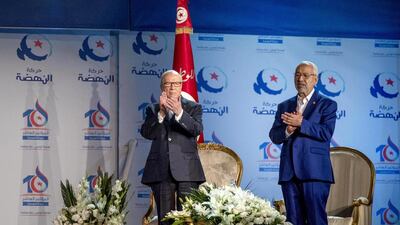Following my attendance at Ennahda’s party congress in Tunis last month, when the organisation adopted a raft of resolutions that rebranded the party from “Islamists” to “Muslim Democrats” and split the movement into separate religious and political wings, I have been arguing that the intentions of the organisation’s leadership, which remain hotly debated, are effectively irrelevant.
The key to the irreversibility of Ennahda’s rebranding is not the sincerity of its leadership in really moving past their Muslim Brotherhood origins. On the contrary, their commitment is beside the point. Instead, the key is that Tunisia is a genuine, albeit fragile, constitutional democracy.
In an undemocratic context, private views are essential. Political leaders will seek power, and, if they gain it, will then do what they wish. In that context, their personal opinions are all-important.
This is not how things function in a democratic system, where parties are, like it or not, bound by their own branding. They must be what they say they are, or the voters will turn on them. So will parts of their own constituency and leadership, which embraced the rebranding as a serious commitment and were not privy to any private reservations.
It is a simple matter for a secret society or underground group, as Ennahda once was, to be duplicitous in its public appeals.
But now that it is an above ground organisation vying for power in an open and constitutional Tunisian system based entirely on voting in free and fair elections, this is no longer workable. In order to remain credible, even within its own ranks, Ennahda will have to become the very “Muslim Democrats” – analogous to the “Christian Democrats” in Europe – they now claim to be.
What about the behaviour of the Muslim Brotherhood in Egypt when they were elected, I’m asked. Well, this proves my point. Egypt was and is not a constitutional democracy.
Therefore, when Mohammed Morsi of the Brotherhood took power as Egypt’s president, he was under no publicly-driven political compulsion to behave in an open, equitable and reasonable manner.
And indeed, he did not. Mr Morsi began to amass power in a perfectly outrageous manner and made it clear that he intended, over the medium term, to stack the entire government bureaucracy with brotherhood ideologues and apparatchiks. Mr Morsi thereby provoked public outrage that even dwarfed the enormous protests against his predecessor, Hosni Mubarak, and he was ousted by a popularly backed military intervention.
Precisely because Egypt was not democratic, the only means to hold a Muslim Brotherhood government accountable was a similarly undemocratic, albeit then highly popular, extralegal intervention. At the time I called it “a coup by acclamation,” which most accurately summarises this sui generis turn of events.
What about Turkey, others ask. Again, this proves my point. Turkey has at times been more democratic than Egypt ever was, but it has also never been a fully fledged democracy as Tunisia has definitely become. Therefore, the personal inclinations and prejudices of president Recep Tayyip Erdogan are not only relevant, they are decisive.
Mr Erdogan rules Turkey like an old-fashioned Latin American caudillo, and anyone who believes that present-day Turkey is either democratic or constitutional in any meaningful sense is simply delusional.
When a single individual has accumulated all practical authority within a political party which, in turn, has come to monopolise national political power and authority (including through winning votes), this is not only undemocratic and unconstitutional, it is autocratic, arbitrary and borders on the despotic. Of course it matters in Turkey what Mr Erdogan privately thinks. Indeed, little else matters for the country’s biggest decisions.
So the mendacity of Mr Morsi in Egypt and Mr Erdogan in Turkey don’t contradict, but rather reinforce, that Tunisia’s constitutional democratic system will force Ennahda to be what they now claim to be: post-Islamist Muslim Democrats. Obviously should there be a regression towards dictatorship, autocracy or authoritarianism, all bets are off.
But as long as Tunisia remains fundamentally democratic and constitutional, Ennahda will have to live up to its new brand. Democratic politics is like religion: since no one knows what’s in anyone else’s heart, public words and deeds are all that matter. Islamists, above all, should be able to grasp this.
Others claim the Justice and Development Party in Morocco preceded Ennahda as a post-Islamist party. But because their reforms were made effectively under duress and the watchful eye of the King, their long-term intentions remain an important concern.
Finally, Ennahda’s historic transformation is already having a regional impact. In Jordan, for example, the Muslim Brotherhood has split into two, or possibly three, separate movements, at least one of which is likely to emulate the post-Islamist Ennahda transformation.
Should democracy in Tunisia thrive, as it must, and Ennahda can demonstrate the viability of a post-Islamist Muslim Democratic party, the long-term impact on Arab political culture is likely to be enormously healthy. It’s already begun.
Hussein Ibish is a senior resident scholar at the Arab Gulf States Institute in Washington
On Twitter: @ibishblog


